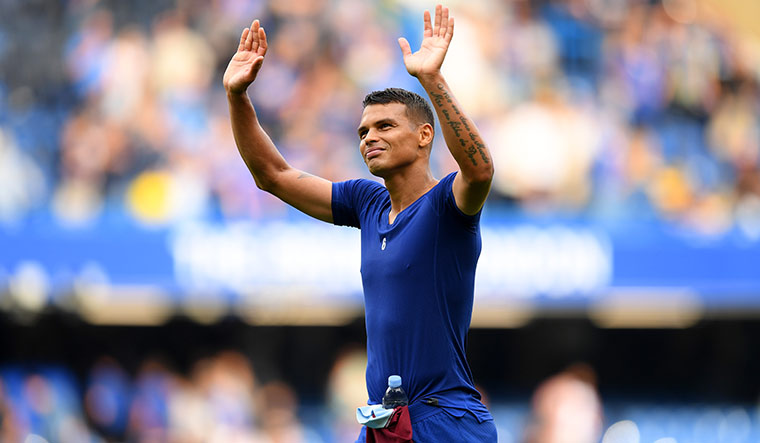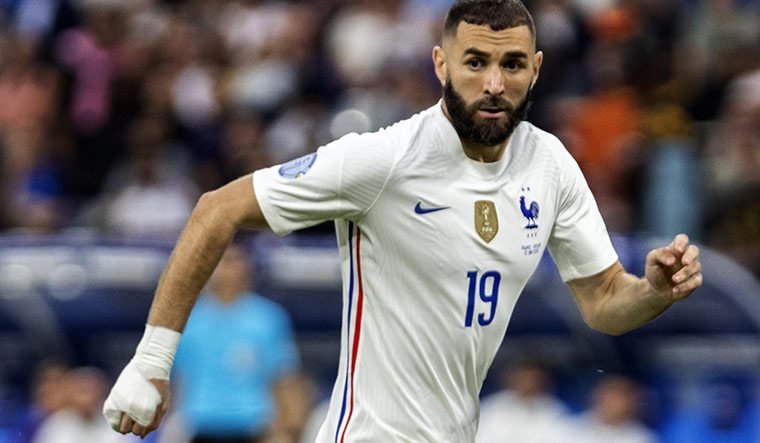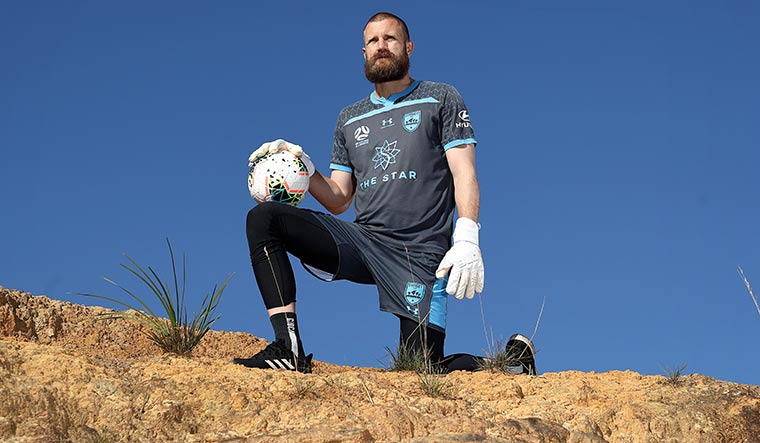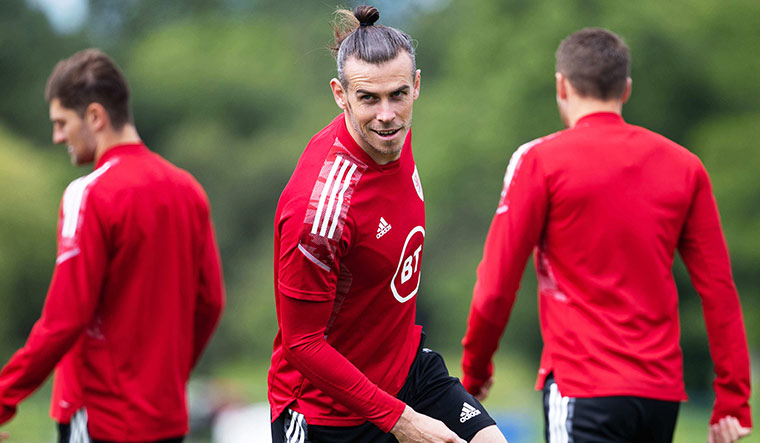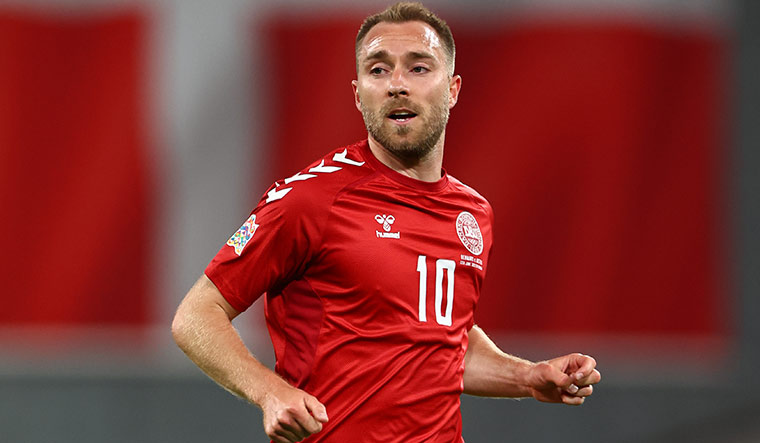David Beckham went to France 1998 as England’s “Golden Boy”. In the round of 16, he acted like a child—kicking Diego Simeone after the Argentine fouled him. He was sent off; England were eliminated. Millions of fans saw Beckham as the cause for the team’s exit. Tabloids turned toxic. One even printed a dartboard with Beckham’s face on the bulls-eye and the 23-year-old was hanged in effigy in London.
Three years later, Beckham, as captain, scored a stunning free-kick in added time to secure England’s spot at the 2002 World Cup. He would also score the winner against Argentina at the tournament. Beckham’s comeback, remarkable as it was, is just one of many such tales football has given us.
Another David (Martindale), for example, went from youth player at Scottish giant Rangers to a life in organised crime. He was arrested in 2004, aged 29, served time, and then, slowly, built a career in football as a respected manager (now at Livingston in the Scottish first division).
Football also facilitated the redemption of Bert Trautmann, a Nazi soldier brought to Lancashire as a prisoner of war. He settled there, engaged in farming and goalkeeping for the local team. He moved to top-tier Manchester City in 1949. Fans protested, but he won them over and entered football folklore after playing with a broken neck, and making crucial saves in City’s 1956 FA Cup final win. He was voted as player of the year by English football writers. Trautmann, who died in 2013 at 89, was appointed an honorary Officer of the Order of the British Empire.
More recently, Junior Messias went from failed youth player to Serie A winner. Along the way, he was, as an undocumented migrant in Italy, a brick polisher and a delivery man. Messias, 31, is now a regular for AC Milan (and a legal resident), but he would find it difficult to break into Brazil’s World Cup squad.
While we may not see Messias in Qatar, there are a few—almost certain to be called up for World Cup duty—who had to overcome their own distinct challenges. These are their stories.
Luka Modric
The only man not named Messi or Ronaldo to win the Ballon d’Or (2018) since 2008. Modric has been lucky to not experience too many downs in his career. There was a struggle to establish himself at Real Madrid, after joining for €30 million in 2012. He eventually cemented his place and is key even now, aged 37.
But, the Croatian saw much adversity in his personal life. He fled his village aged six after Serbian militia executed his grandfather and burned down the family home. His family fled to the coastal city of Zadar, where Modric found refuge in football.
Even as he dazzled onlookers with his talent, there was heartbreak in store—rejection by Hajduk Split, the club he supported. But, Modric got his chance at the biggest club in Croatia, Dinamo Zagreb. At Dinamo, he met Zdravko Mamic—once regarded the most powerful man in Croatian football, now a fugitive convicted for tax evasion and embezzlement.
In 2017, Modric testified at Mamic’s trial. In an alleged attempt to protect Mamic, he modified his statement and was charged with perjury. Croatia’s captain went to Russia 2018 with a possible prison sentence hanging over him. Moreover, the case was being followed closely by fans, who were sick of corruption in the football setup. So, Modric’s reputation in his homeland hit an all-time low.
It seemed to take a toll on the normally cool Croatian. When asked by a reporter at the World Cup if the case was a distraction, Modric responded: “Nothing smarter to ask? It’s a World Cup, not about other things. How long did you prepare to ask this kind of question?” As it turned out, his performances in the tournament answered the reporter’s question. Neither Modric nor his team were distracted. He led Croatia to the final and won the Golden Ball.
Croatian journalists maintain that there are those who will never forgive Modric. But, as the captain stood atop an open bus in Zagreb in July 2018, thanking his people for their support, he could not be blamed for thinking he had earned back their embrace. After all, more than half a million had gathered to welcome the team.
Thiago Silva
It may now be difficult for younger football fans to remember a time when Silva was not counted among the world’s best defenders. But, the journey to the top has been a difficult one for the Brazilian.
He began his youth career with Fluminense as a defensive midfielder. Opportunities for progression were limited and he tried to get a transfer. After four unsuccessful trials, he signed for a lower-division team. Silva got a move to top-division Juventude in 2003. Under coach Ivo Wortmann, he transitioned into a defender. A stellar season prompted European champions Porto to pay €2.5 million for him.
In January 2005 Silva arrived in Portugal with a big reputation, but he did not play for Porto’s senior team in his first six months. The 20-year-old was unable to match the pace of his teammates and kept complaining of flu-like symptoms. Porto’s doctors could not find the source of his illness. The club lost patience with him and he was shipped out to Dynamo Moscow.
He never played for Dynamo either. But, Russian doctors found the source of his troubles—tuberculosis. Said Silva: “The doctors told me I would be sidelined for 12 weeks because the lungs were compromised.” By the time he recovered, he had not played a match for almost two years. Silva decided to retire, aged 22, and returned to Brazil.
His mother, Angela, would have none of it. After all, in the crime-infested locality of Rio de Janeiro where Silva grew up, there were not a lot of “good jobs”. Wortmann, who had taken over at Fluminense, gave his former star pupil a second chance. Silva returned to his boyhood club, but this time as a starter.
He played over 100 times for Fluminense in the next three years, establishing himself as one of Brazil’s best defenders. He earned his nickname, The Monster, and made his Brazil debut in 2008. In 2009, he returned to Europe with AC Milan for €10 million. Soon, the football world was abuzz with talk of Milan’s Monster—a defender you just could not dribble past. This time, Silva lived up to the billing.
In 2012, Paris Saint-Germain made him the most expensive defender, at the time, by shelling out in excess of €40 million. After eight trophy-filled years in the French capital, Silva moved to the English capital in a free transfer to Chelsea. He will turn 38 in September, but continues to be a key player for both Chelsea and Brazil.
Karim Benzema
Benzema is the favourite to win the 2022 Ballon d’Or in October. If he does so, he will be the second man other than Messi or Ronaldo to win the award since 2008, after club colleague Modric.
Like Modric, Benzema, too, initially struggled to establish himself at Real, the club he had joined for €35 million in 2009. But, he improved year-on-year and became part of the team’s celebrated attacking trio alongside Cristiano Ronaldo and Gareth Bale—dubbed BBC. The Frenchman is also like Modric in that his troubles were not on the ground, but in the courtroom. But, unlike Modric, he was convicted.
The Algerian-born striker has never been far from controversy. He has often been criticised for his reluctance to sing the French national anthem. He was caught in a scandal in 2010 for allegedly hiring an underage prostitute. The charge was dropped in 2014. But, a year later, he was arrested for his alleged role in blackmailing France teammate Mathieu Valbuena with a sex-tape.
Then French prime minister Manuel Valls responded to the case with: “A great athlete should be exemplary. If he is not, he has no place in the France team.” Benzema was suspended from the national team in December 2015. He was kept out of the French squad till the case came to a conclusion. In 2021, he was given a one-year suspended sentence and a fine of €75,000.
During this exile, Benzema developed into one of the world’s best players. But, he did not always behave with grace. In March 2020, he said that Olivier Giroud, who led the line as France won at Russia 2018, was karting, while he was Formula 1.
Benzema’s redemption in French colours is an unfolding narrative. The 34-year-old was injured on September 7, but is expected to recover well before the World Cup. In Qatar, he would have the support of, arguably, the strongest team, on paper. Nothing less than glory would do.
Andrew Redmayne
Unlike the others featured on these pages, Redmayne was never a bona fide star. The goalkeeper did star for Australia at the youth level and came close to securing a contract with Arsenal in London. But, it did not quite materialise.
The 33-year-old, from Central Coast, New South Wales, has, so far, spent his entire club career in Australia. He started with Central Coast Mariners in 2008 and hopped from club to club, never managing to hold down a starting place. In 2015, he joined Western Sydney Wanderers, his fourth club in seven years.
In 2016, after a particularly bad run of form, the 27-year-old started feeling as if he had no future in football. “Self-belief came into it,” he told The Guardian in 2022. “I just did not think I was good enough, to be honest. It was a pretty rough stage of my life.” He completed a barista course and was ready to start work at a cafe.
But, just as he was about to give up, his club informed him that he would have go to Sydney FC as part of a player swap. Sydney was then managed by Graham Arnold and the goalkeeping coach was John Crawley, who was Redmayne’s first goalkeeping coach. He helped Redmayne recover his confidence and form.
At the start of the next season, Redmayne became Sydney’s first-choice keeper. At the end of the season, he was voted into the player’s choice team of the year as the best goalkeeper in the league. In 2019-2020, he won the expert’s choice goalkeeper of the year award and, in 2022, he made the Australian league’s all-star team.
Arnold took over the Australia team in 2018 and Crawley joined his staff. Redmayne finally got a national call-up in 2019. He made his second appearance for the side in 2021 and is now the back-up for team captain Mathew Ryan.
On June 13, 2022, Australia played Peru in an intercontinental play-off match for World Cup qualification. In the 120th minute, with the match heading to a 0-0 draw, Redmayne was substituted in for Ryan with the penalty shoot-out in mind. He saved the decisive penalty to book Australia’s ticket to Qatar 2022.
Gareth Bale
Real Madrid paid a then world record fee of around €100 million to bring Bale—the other B in BBC—to Spain in 2013. While the other two Real players featured were affected by issues off the pitch, the Welshman suffered recurring injuries and fell out of favour with the notoriously impatient fan base of the Spanish giants.
It was always clear that Bale’s best attributes were physical. Two-and-half years before Real signed him, Spanish newspaper El Mundo wrote: “Bale combines the height and build of an 800-metre runner with the acceleration and directness of a rugby winger.” As it transpired, it was his explosive physicality that prevented him from holding on to his position among the world’s elite. “As he generates so much power, a bad warm-up or a cold day can mean that he [gets injured],” Juande Ramos, who had managed Bale at Tottenham Hotspur, told Goal in 2018.
As Bale spent more time out injured, malcontents in Madrid targeted him, despite his decisive performances in big matches. Local media criticised him for not being fluent in Spanish. A TV presenter joked: “Sell him and say ‘Thank you’, because ‘Gracias’ he won’t understand.” The evident drop-off in his physical attributes also added to his unpopularity among fans.
However, despite his troubles at club-level, the Welsh captain has continued to be the talisman for his national side. He was pivotal in the team qualifying for the World Cup for the first time in 64 years. In the last two qualifying matches—play-off wins against Austria (2-1) and Ukraine (1-0), Bale scored all three goals. Against Austria, in particular, he carried the team to victory almost singlehandedly. Welsh goalkeeper Wayne Hennessey explained the phenomenon of ‘Wales Bale’ as follows: “The Welsh public are so grateful to have a Gareth Bale that they don’t put pressure on him. They’re just so happy we have a player of that quality. Even if Gareth had the worst game of his life, scored a couple of own goals and got sent off, Welsh fans would never lambast him. They appreciate that we are lucky, as a small country, to have a superstar.”
Bale, 33, finally left Real Madrid this year to join Los Angeles FC. Perhaps, without the negativity from Madrid, Bale can roll back the years and give a good account of himself on the grandest stage.
Christian Eriksen
Throughout his career, Eriksen has been highly regarded for his ability to orchestrate the attack, his work-rate and football intelligence. When he collapsed after suffering a cardiac arrest during a game at Euro 2020, in June 2021, it seemed like his career was over, aged only 29.
Of course, the immediate concern was for Erisken’s well-being. Fears regarding the Dane’s survival were based in the deaths of hundreds of players attributed to sudden cardiac arrests or other unexplained causes while playing or shortly after playing. The FIFA Sudden Death Report, published in 2020, said that 617 footballers had died in the five-year period from 2014 to 2018.
There was hence much relief when, three days later, Eriksen posted a selfie from hospital along with a statement that he was fine “under the circumstances”. It was announced that he would be fitted with an implantable device, “necessary due to rhythm disturbances”.
Six months after his cardiac arrest, Eriksen’s Italian club Inter Milan terminated his €10-million-a-year contract. Eriksen returned to his roots and began training at his boyhood club Odense Boldklub. On January 31, 2022, he signed for Premier League club Brentford on a six-month contract.
Brentford, which was competing in the top flight for the first time in 74 years, was sliding down the table when Eriksen joined. In the 10 matches he started, he played the full 90 minutes every time and the team lost only twice. The seven wins and one draw added up to 22 points—almost half of the team’s season total—and propelled it to a respectable 13th place finish.
Manager Thomas Frank was ecstatic. “You can give it to Christian and he’ll always find a solution,” he said, after a 4-1 win against Chelsea. Frank also praised Eriksen’s determination to play in the World Cup. Eriksen is now a starter for Manchester United on a contract worth close to €9 million-a-year.
He returned to international football on March 26, 2022, and scored two minutes into his comeback. He also scored in his second match back for Denmark, three days later.



